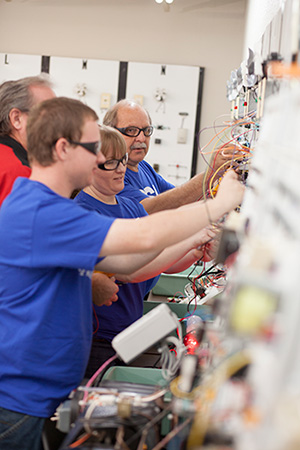TWS is a Great Training Option for Everyone
Learn more about how we can prepare you to advance your career.
Becoming an Electrician can be a promising career. There are many opportunities in this field especially in the construction industry. 1 The median annual wage for electricians is higher than that for other construction workers. 2 Better pay and opportunities are a couple of the many benefits of becoming an electrician.
After completing electrical training, electricians typically first work as trainees or apprentices. Two advancement options in the field are journeyman electrician and master electrician. A journeyman is a trained and experienced electrician who can work on his or her own under the general guidance of a master. A master develops projects, gets permits for construction and installations, and oversees the work of journeymen and trainees.
How Do People Become Journeyman and Master Electrician?

- Training: To become a journeyman, an electrician has to work three to six years as an apprentice under the direct supervision of a master and pass a journeyman test. He or she must also have completed electrical training on the National Electrical Code and basic electric principles. Master electricians have more education than journeymen. They are educated in fundamentals of electricity, building codes, project management, and safety regulations.
- Experience: After finishing electrical training, electricians usually start out as trainees or apprentices. To become a journeyman, he or she must work for typically 8,000 hours under general supervision of a master. Master electricians have much more experience than journeyman electricians. A journeyman electrician normally needs to finish at least 12,000 hours of work before he or she can qualify for a master electrician license. 3
- Work: A journeyman electrician works without direct supervision, installing working outlets, and fixtures. He or she also does service work and troubleshoots problems. Master electricians lay out wiring systems and installations according to electrical codes. He or she gets work permits and supervises other electricians.
- Advancement: A journeyman electrician can become a master electrician. A master electrician can become an electrical contractor and run his own business. As a contractor, he or she is required by law to maintain state-required insurance coverage, while a journeyman is not.
- Job Outlook: Job prospects are positive for both journeyman and master electricians. The need for electricians is projected to grow 14% from 2014 to 2014, which is much faster than average. 4 Yet, job prospects are best for those who can perform many tasks and bring different skills, which would give master electricians an edge in the labor market. 5
Training for Your Electrician Career
There are many different opportunities for electricians. Advancing to a journeyman or even master electrician can significantly boost your employment chances and salary potential. Given that many employers prefer electrical training graduates, electrician training can be the first step in your electrician career planning.
Have You Considered a Career in the Skilled Trades?
Fill out the form to recieve a no obligation info packet.
1 – http://www.latimes.com/business/la-fi-skilled-workers-jobs-20160902-snap-story.html
2 – https://www.bls.gov/ooh/construction-and-extraction/electricians.htm#tab-5
3 – http://www.ehow.com/info_12087359_journeyman-vs-master-electrician.html
4 – https://www.bls.gov/ooh/construction-and-extraction/electricians.htm
5 – https://www.bls.gov/ooh/construction-and-extraction/electricians.htm#tab-6
This blog has been labeled as archived as it may no longer contain the most up-to-date data. For a list of all current blog posts, please visit our blog homepage at https://www.tws.edu/blog/







